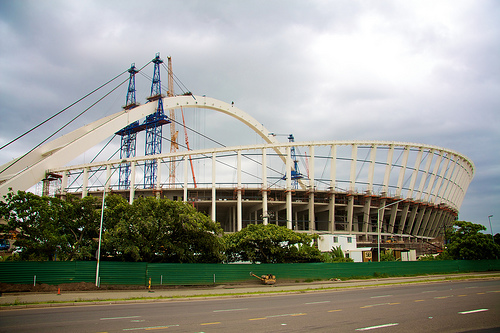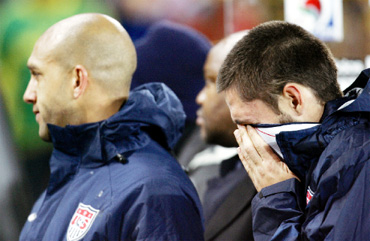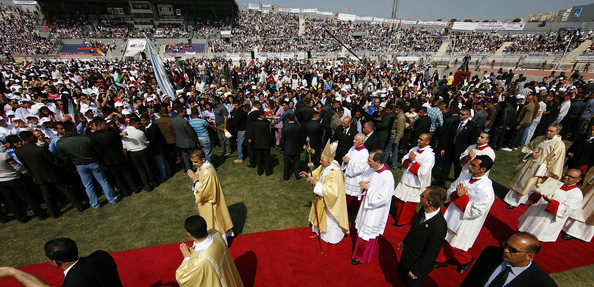Christopher Merrett

Football is often described as the “beautiful game”. Indeed, it is. As Michael Worsnip pointed out recently (The Witness, June 12), football on the local recreation ground reduces the possibility that young people will be tempted into crime. And, of course, South Africa will host a successful Fifa World Cup next year — if it tries hard enough. All of this is obvious. But what is crucially missing from public debate are a number of awkward political, economic and social questions.
New documentary on 2010 World Cup
Trailer for Fahrenheit 2010 – Warming Up for the World Cup in South Africa on TrailerAddict.
FAHRENHEIT 2010: WARMING UP FOR THE WORLD CUP IN SOUTH AFRICA
directed by Craig Tanner, Australia/South Africa (2009) documentary
The measured Fahrenheit 2010 systematically examines the expectations of a variety of South Africans on the country’s staging of the 2010 FIFA World Cup. Focal points of the film are South Africa’s socio-economic disparities and debate as to whether the erection of state of the art sports arenas will leave the country with white elephants which it can ill afford. Interviewees include Danny Jordaan, Desmond Tutu, Michael Sutcliffe, Jomo Sono, Dennis Brutus and also, amongst others, construction workers, street traders, soccer players and the sangoma with the answer to Bafana Bafana’s woes.
White elephants?
Report in the South African newspaper, The Mercury
THE fate of some of South Africa’s oldest stadiums, including Durban’s
Absa Stadium, is already decided, despite the emotional debate expected
to rage around the continued existence of these venues.
Danny Jordaan, CEO of Fifa’s 2010 Local Organising committee, said at
the African Journalism Awards 2010 media debate in Durban on Friday,
that a decision to demolish the Boet Erasmus stadium in Port Elizabeth
had already been taken and that both Newlands and the Absa stadium in
Durban would share the same fate in time.
Responding to a question on whether the new stadiums would be white
elephants once the World Cup was over, Jordaan said the lifecycle of any
stadium was 50 to 70 years and that Newlands and the Absa stadium were
reaching their sell-by date.
“This is an emotional debate that will go on for a long time, but who,
once they have experienced the new, modern, sophisticated stadiums will
want to go back to the old ones? South Africa has made a bid to host the
Rugby World Cup in 2015 and if we win that, the games will most
certainly be hosted in the new stadiums. If that happened it would
certainly help to move this debate along,” he said.
Sharks rugby CEO Brian van Zyl said the issue hadn’t been raised with him.
“That’s the first I’ve heard of it and it’s absolute nonsense? Jordaan’s
opinion of Absa is subjective. In any case, we have made a promise to
all our stakeholders that before we make any decisions regarding this
stadium we will consult with them through a transparent process. To
date, the indication from many of them is they don’t want to move – I
guess it could be considered an emotive issue, but it’s about a culture.”
Van Zyl said according to clause six of the South African Rugby Union’s
constitution all international rugby matches, including the World Cup,
would be played at rugby venues. “And I don’t think that’s about to change.”
Western Province Rugby Union’s managing director, Rob Wagner, said it
was also the first he had heard of it.
“We own the stadium, there is no debt on it and it’s probably one of the
oldest rugby grounds in the world. It has heritage and tradition, why
would we want to demolish it? I can’t understand how Jordaan could have
said that.”
ESPN’s Outside the Lines sent its presenter, Bob Ley, to South Africa to report on the preparations for the World Cup. It is an informative, fair piece in stark contrast with the nonsense published in the UK press, including in The Guardian. You can watch the rest of the report at the program’s website (scroll down and look on the right).
Goal of the Week
While most other European leagues are on break, competitive football is being played in Scandinavia. Like in Norway. There, Hunter Freeman, an American defender playing at Premier League club, I.K. Start, scored a freak goal from about the halfway line in a league game earlier this week.
‘USA a team of extremes’

The United States’ Confederations Cup adventure generated a wide variety of reactions in America: pride in a strong effort, disappointment at letting a trophy slip away and, understandably, puzzlement. After all, not many squads can look awful against Brazil one week then nearly beat them the next. “Which team will show up during the rest of World Cup qualifying, as well as in South Africa next summer?” wrote ESPN’s Jeff Carlisle. “Will it be the side that struggled early during the tournament or the one that finished with a flourish, even in losing a heartbreaking final to Brazil?”
A likely answer is: both. Instead of fretting over the US’s baffling form, however, we should revel in it. The traditional soccer narrative of the United States, dating to the 1970s, highlights the country’s supposedly enormous potential. But rather than waiting another few decades for the US to become a power, why not embrace its unpredictable, quirky side?
True, the current edition of this team is infuriatingly inconsistent. But at least it’s a marvel of inconsistency. Whereas Mexico always lose in the second round of the World Cup – yawn – the United States’ sheer unpredictability makes the team worth following. In June alone, Team USA was routed by Costa Rica in World Cup qualifying, then confidently snapped Spain’s three-year unbeaten run.
While all teams have peaks and valleys over time, the US frequently packs them into 90 minutes. Consider the World Cup campaign. In El Salvador in March, the US played a horrible 75 minutes to fall behind 2-0, before a frantic rally produced two late goals and further untaken chances. At home to Honduras in June, the US fell behind within five minutes before scratching out a victory – an uneven performance personified by Carlos Bocanegra, who headed in the winner, then immediately got taken off with an injury after the restart. With these guys, good and bad are intertwined.
Impressively, the United States can produce these trademark half-good, half-dismal efforts against anyone. And they don’t always involve late rallies. Against Brazil and Italy in the Confederations Cup, fast starts and half-time leads were followed by three-goal second-half meltdowns. The excitement of sport comes from its uncertainty, does it not?
As a bonus, Team USA routinely makes blowhard pundits look silly. “We have raised a generation of boys as opposed to men in US soccer,” said Alexi Lalas after the slow start in the Confederations Cup. The national team then promptly rolled into the final. And while Lalas and fellow TV commentator John Harkes spew out ever-shifting prescriptions for coach Bob Bradley – better attitude, more domestic players, more steel in midfield – the reality is that no one knows how the team will perform at any time. As Tim Howard said after the 3-0 win over Egypt: “We are scratching our heads just like you guys.” Who needs experts? This team calls into question the whole premise of expertise.
Ultimately, it’s futile to extract lessons about the national team’s long-term future from every match. The future is already here, and the US has firmly established itself. Not as a world power, but as one of those rare national teams – think Portugal or Nigeria – whose mystifying form is itself an attraction. Granted, this is not what many American fans desire most, given their expectations of sporting dominance. But for some of us, it’s a welcome state of affairs.
Peter Dizikes in (the British) When Saturday Comes.

The Vatican has weighed in on Real Madrid’s nearly $300 million spending spree for three players (Cristiano Ronaldo, Kaká and Karim Benzema). The Vatican’s newspaper, Osservatore Romano, said in an editorial that exorbitant transfer fees would bankrupt teams and could increase the influence of organized crime. “It is good to ask oneself whether the figures paid by Real Madrid’s president in a period of economic and financial crisis are justifiable from a purely economic viewpoint or whether they are inexplicable even under market laws,” the editorial said. “It is also necessary to see whether they are compatible with, or destabilizing for, the soccer world.
[Via Goal]